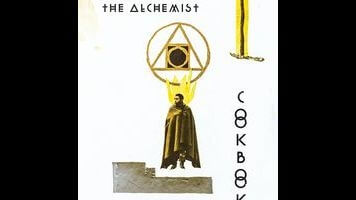Personal and supernatural demons haunt the unclassifiable Alchemist Cookbook

A trailer home sits hidden away in a wooded Michigan acreage not too far from Grand Rapids. Its occupants are an alienated and angry young man (flannel, Minor Threat T-shirt, chinstrap beard) and his cat, Kaspar. The young man toils with a small hacksaw and mortar and pestle, in a workshop that looks like a meth lab built by middle schoolers. He has a little book of what appear to be spells and alchemical formulae, which he is using to summon the demon Belial, who will bring him gold. The young man, named Sean, has secluded himself and has been living this way for some time. Mental illness may play a role. Lab supplies and groceries are brought on an irregular schedule by a sympathetic relative—probably not a brother, but maybe a cousin—named Cortez. He’s a small-time thief and the only other human character in Joel Potrykus’ The Alchemist Cookbook.
Potrykus’ work fits no niche except the one he has carved out for himself in three features: this film, last year’s Buzzard, and the earlier Ape. It’s punk in spirit and sometimes grotesque for grotesque’s sake, completely non-mainstream but not inaccessible, in part because Potrykus (himself based in Grand Rapids) never misplaces his affection for bug-eyed, self-mutilating Midwestern losers and because he knows what’s funny. (And, in the case of The Alchemist Cookbook, unexpectedly scary.) But what he gets on a deeper level than anyone else making movies right now are slackerish delusions of grandeur and revenge and the private megalomania of the eternal nobody. He sympathizes with the monsters we like to imagine within ourselves when we feel down, out, angered, and abandoned. His heroes (too sympathetic to be called anti-heroes) are dregs of society living on the fringe of a desolate world still stuck in the late 1990s or early 2000s; they don’t harbor violent fantasies so much as become subsumed by them.
In many respects, The Alchemist Cookbook is a horror film, following the example of so many low-budget backwoods creepfests about ghouls and demons lurking among cracking branches and crinkly dead leaves. (Sam Raimi’s original Evil Dead is the obvious reference.) But though it shows an increase in technical sophistication over Buzzard—Potrykus’ hilarious portrait of a dimwitted conman unraveling in a fantasy of himself as a criminal mastermind waiting to be caught—it’s a sparser movie and even more underground. As Sean, Gimme The Loot’s Ty Hickson gives what is very nearly a solo performance, ranting, guzzling soda, wolfing down Doritos, listening to The Smoking Popes and a warbly recording of “Jingle Bells,” sacrificing an unfriendly possum to evil forces. Like the protagonist of Buzzard, Sean is identified with George Miller’s Mad Max; he wears a stiff metal brace over his left leg, à la The Road Warrior. He is Potrykus’ poignant version of the loner in the wasteland, calling on unseen forces to get back at a world that is also unseen.
It’s difficult to imagine what a script for all of this would even look like. Whatever The Alchemist Cookbook has to express, it expresses through scenes that feel as though someone were dared to do something while a camera rolled, in the near-extinct tradition of the transgressive underground movie. (They’re not unfocused or formless, though; one of the must-see scenes in Buzzard—in fact one of the most affecting depictions of bliss in recent film—is of the hero idly slurping a plate of spaghetti in a white robe, an image returned to here in a monologue.) Yet at the same time, the movie follows an almost classical arc, its structure most obvious through the three lengthy scenes that Sean shares with Cortez (Amari Cheatom, in a role that’s just as demanding as Hickson’s, but with only a fraction of the screen time), which trace a progression: day, dusk, pitch darkness. This is the movie’s own transformation from weirdo comedy—including an indescribable moment where Cortez, the average Joe of the two, somehow hustles himself into eating cat food—to comic nightmare. The bodies change, too, twisted and lacerated by the dark arts—but not the chilly corner-of-nowhere landscape.